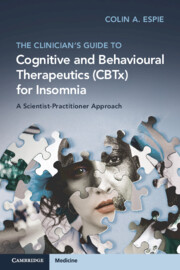 The Clinician's Guide to Cognitive and Behavioural Therapeutics (CBTx) for Insomnia
The Clinician's Guide to Cognitive and Behavioural Therapeutics (CBTx) for Insomnia Book contents
- The Clinician’s Guide to Cognitive and Behavioural Therapeutics (CBTx) for Insomnia
- Reviews
- The Clinician’s Guide to Cognitive and Behavioural Therapeutics (CBTx) for Insomnia
- Copyright page
- Dedication
- Contents
- Acknowledgements
- Glossary
- Introduction
- Section 1 Sleep, Its Function, and Insomnia
- Chapter 1 What Is Sleep?
- Chapter 2 Why Does Sleep Matter?
- Chapter 3 What Is Insomnia?
- Section 2 CBT and Its Application to Insomnia
- Section 3 Assessing Insomnia from a CBTx Perspective
- Section 4 Treating Insomnia Using the CBTx Approach
- Section 5 Implementing CBTx for Insomnia at Scale
- References
- Index
Chapter 1 - What Is Sleep?
from Section 1 - Sleep, Its Function, and Insomnia
Published online by Cambridge University Press: 20 December 2024
- The Clinician’s Guide to Cognitive and Behavioural Therapeutics (CBTx) for Insomnia
- Reviews
- The Clinician’s Guide to Cognitive and Behavioural Therapeutics (CBTx) for Insomnia
- Copyright page
- Dedication
- Contents
- Acknowledgements
- Glossary
- Introduction
- Section 1 Sleep, Its Function, and Insomnia
- Chapter 1 What Is Sleep?
- Chapter 2 Why Does Sleep Matter?
- Chapter 3 What Is Insomnia?
- Section 2 CBT and Its Application to Insomnia
- Section 3 Assessing Insomnia from a CBTx Perspective
- Section 4 Treating Insomnia Using the CBTx Approach
- Section 5 Implementing CBTx for Insomnia at Scale
- References
- Index
Summary
People may believe sleep to be simply a static state that is the direct opposite of wakefulness; however, this is not the case. Rather, it is a complex and dynamic process, and throughout sleep we progress through multiple stages that can be measured discretely across behavioural, physiological, and cognitive domains. This chapter describes the differences and features of these different stages and how they can be measured. Also described is the fact that sleep and wakefulness are not mutually exclusive, and that there are times when the lines between sleep and wake can be blurred, and this is notably true in insomnia. Finally, the chapter explains how sleep is regulated through interacting homeostatic and circadian processes, and the neuroscientific underpinnings of the sleep and circadian system.
- Type
- Chapter
- Information
- The Clinician's Guide to Cognitive and Behavioural Therapeutics (CBTx) for InsomniaA Scientist-Practitioner Approach, pp. 7 - 21Publisher: Cambridge University PressPrint publication year: 2025
